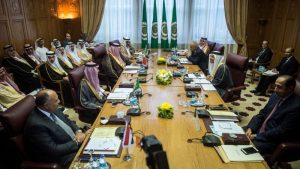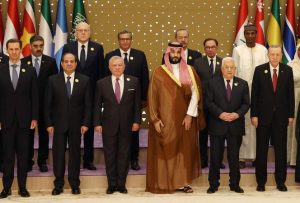In a significant move for regional security architecture, the Council of the Arab League at the ministerial level recently convened and announced the appointment of the Kingdom of Saudi Arabia as the chair of the Arab League’s Expert Group on Counter-Terrorism for a two-year term. This decision, made during a session that also saw the appointment and term renewal of several other key officials within the League’s bureaucracy, is far more than a routine diplomatic rotation.
-
1.
The Arab League and the Persistent Challenge of Terrorism: A Historical Overview
- 1.1. Why Saudi Arabia? The Rationale Behind the Appointment
- 1.2. The Broader Context: Other Appointments and a Renewed Arab League
- 1.3. The Agenda Ahead: Key Challenges for the Saudi-Led Committee
- 1.4. Geopolitical Implications: A Message to the World
- 1.5. Potential Pitfalls and the Need for Inclusivity
- 1.6. Conclusion: A Defining Leadership Role for a New Era
The Arab League and the Persistent Challenge of Terrorism: A Historical Overview
It represents a profound vote of confidence in the Kingdom’s capabilities and a strategic alignment of the Arab world’s fight against extremism.
Placing Saudi Arabia at the helm of this critical committee signals a collective desire to leverage the Kingdom’s growing diplomatic clout, its extensive experience in countering extremist financing, and its ambitious socio-economic transformation project as a blueprint for a comprehensive approach to security.
This article will delve into the implications of this appointment, exploring the historical context of Arab counter-terrorism efforts, the specific strengths that the Kingdom brings to the role, the challenges that lie ahead, and the broader geopolitical message this sends to the world.
The Arab League, formally known as the League of Arab States, has long recognized terrorism as a primary threat to the stability, development, and very fabric of its member states.
From the destabilizing actions of groups like Al-Qaeda and its affiliates to the apocalyptic territorial control exerted by ISIS/Daesh, the region has been the epicenter of global terrorist activity for decades. In response, the League has developed a multi-faceted framework to coordinate a collective response.
Key pillars of this framework include the 1998 Arab Convention for the Suppression of Terrorism and its subsequent updates, which aim to harmonize legal definitions and judicial cooperation among member states.
The Expert Group on Counter-Terrorism operates within this framework. It is a technical and policy-oriented body composed of senior officials and specialists from member states.
Its mandate is critical: to develop joint strategies, share intelligence, coordinate positions in international forums like the United Nations, and implement programs aimed at countering violent extremism (CVE) and stemming the flow of terrorist financing.
The chairmanship of such a group is not ceremonial; it involves setting the agenda, driving initiatives, and acting as the primary coordinator for 22 diverse nations.
The decision to entrust this responsibility to the Kingdom of Saudi Arabia is a testament to the recognition of its evolving role from a regional power to a global leader in shaping security and ideological discourse.
Why Saudi Arabia? The Rationale Behind the Appointment
The selection of a chair for such a sensitive committee is never arbitrary. Several compelling factors make the Kingdom of Saudi Arabia a logical and potentially highly effective choice for this leadership role.
-
Financial Warfare and Counter-Financing Expertise: For years, Saudi Arabia has been at the forefront of global efforts to dismantle the financial networks that fuel terrorist organizations. The Saudi Financial Investigation Unit (SFIU) works in close coordination with international partners like the Financial Action Task Force (FATF). The Kingdom has developed sophisticated systems to monitor and intercept illicit financial flows, experience that is invaluable for a region where hawala systems and illicit trade often bypass traditional banking oversight. As chair, Saudi Arabia can lead efforts to standardize and strengthen financial controls across all Arab League members.
-
The Religious Counter-Narrative: Many terrorist groups, most notably Daesh and Al-Qaeda, have weaponized a distorted interpretation of Islam to recruit followers and justify their atrocities. As the custodian of Islam’s two holiest mosques, Saudi Arabia possesses a unique religious authority to delegitimize these extremist ideologies. Through its Global Center for Combating Extremist Ideology (Etidal) and its support for scholarly initiatives that promote moderate Islam, the Kingdom has been actively developing the theological tools to counter radicalization. Leading the Expert Group allows Saudi Arabia to scale these efforts to a pan-Arab level, promoting a unified, authentic religious counter-narrative.
-
Vision 2030 as a Strategic Blueprint: Perhaps the most significant asset Saudi Arabia brings to the table is its transformative Vision 2030, championed by Crown Prince Mohammed bin Salman. This ambitious plan moves beyond a purely securitarian approach to terrorism by addressing its root causes: economic stagnation, youth unemployment, and over-reliance on hydrocarbon revenues. By championing economic diversification, social reform, and the creation of a dynamic “vibrant society,” Vision 2030 offers a holistic model for preventing extremism. As chair, Saudi Arabia can advocate for a “whole-of-society” approach to counter-terrorism that emphasizes economic opportunity and social inclusion as vital security policies.
-
Diplomatic Re-Emergence: The Kingdom’s recent foreign policy, characterized by diplomatic rapprochement with rivals and assertive leadership in regional affairs, has increased its leverage and ability to coordinate complex multilateral initiatives. This renewed diplomatic capital is essential for chairing a group that includes states with often divergent interests and relationships.
The Broader Context: Other Appointments and a Renewed Arab League
The appointment of Saudi Arabia to this key post was not an isolated event.
The same ministerial council meeting saw the appointment and renewal of terms for several other officials within the Arab League’s structure. These included positions related to economic development, social affairs, and legal coordination.
This simultaneous reshuffling indicates a broader effort to reinvigorate the institution of the Arab League itself.
For much of its history, the League has been criticized for internal divisions and a lack of actionable consensus, often being sidelined during major regional crises.
The coordinated appointment of new leadership across various sectors suggests a conscious effort by member states to enhance the League’s effectiveness and operational capacity.
Placing a heavyweight nation like Saudi Arabia in charge of the critical counter-terrorism portfolio is a central pillar of this renewal.
It signals an intent to move from declaratory politics to actionable policy coordination, with the Kingdom expected to provide the necessary drive and resources.
The Agenda Ahead: Key Challenges for the Saudi-Led Committee
The incoming Saudi-led committee will face a daunting and complex array of challenges. Setting a pragmatic and effective agenda will be crucial for its success.
-
The Evolving Nature of the Threat: The territorial caliphate of ISIS may be defeated, but the threat has metastasized. The committee must focus on the persistent danger of sleeper cells, the rise of lone-wolf actors radicalized online, and the growing threat from affiliates in West Africa and Central Asia, which can have destabilizing ripple effects across North Africa and the Levant.
-
Cybersecurity and Digital Radicalization: The digital battlefield is now paramount. Terrorist groups use encrypted messaging apps, social media platforms, and online gaming networks for recruitment, planning, and propaganda. Developing a coordinated Arab strategy for digital counter-terrorism, involving tech companies and cybersecurity agencies, will be a top priority.
-
Coordinating Military and Intelligence Efforts: While political will varies, improving real-time intelligence sharing and coordinating cross-border counter-terrorism operations among member states is a perpetual challenge. The Kingdom’s strong bilateral security relationships with many members could be leveraged to build trust within a multilateral framework.
-
Addressing Regional Conflicts: Terrorism often flourishes in the vacuum of unresolved conflicts in Yemen, Syria, Libya, and elsewhere. While the committee’s mandate is technical, its strategies cannot be divorced from the political realities of these war-torn regions. This will require delicate diplomacy.
Geopolitical Implications: A Message to the World
The appointment of Saudi Arabia sends a clear message to both allies and adversaries outside the Arab world.
To partners like the United States and the European Union, it signals that the Arab world is taking greater ownership of its security challenges under a capable and proactive leadership. It invites more structured and equal partnerships, moving away from a patron-client dynamic.
To rivals, notably Iran and its network of non-state proxies, the message is one of resolved opposition. It underscores a unified Arab front against all forms of extremism and destabilization, whether it comes from Takfiri jihadist groups or state-sponsored Shiite militias.
By leading the counter-terrorism committee, Saudi Arabia is positioned to further diplomatically isolate Iran within regional forums by highlighting its support for groups classified as terrorist by the Arab League.
Potential Pitfalls and the Need for Inclusivity
Despite the strong rationale, the path forward is not without potential pitfalls. The Kingdom’s leadership will be closely scrutinized.
It must ensure that the committee’s work remains inclusive and does not become a vehicle for Saudi foreign policy objectives alone. Winning the trust of all members, including those with which it has had strained relations like Qatar, will be essential for effective collaboration.
Furthermore, the international community will watch to ensure that the broad mandate of counter-terrorism is not used to justify the suppression of legitimate political dissent or the targeting of peaceful activists under the guise of fighting extremism.
Upholding human rights and the rule of law must be integrated into the committee’s strategies to avoid alienating international partners and the very populations it seeks to protect.
Conclusion: A Defining Leadership Role for a New Era
The decision by the Arab League to appoint the Kingdom of Saudi Arabia as chair of its Expert Group on Counter-Terrorism is a defining moment for regional cooperation.
It is a recognition of the Kingdom’s transformative journey and its potential to lead a sophisticated, modern fight against a pervasive enemy.
This leadership role empowers Saudi Arabia to export its dual strategy of relentless security pressure and visionary socio-economic reform across the Arab world.
The success of this two-year term will not be measured by the number of meetings held, but by tangible outcomes:
a reduction in cross-border terrorist incidents, more resilient communities resistant to extremist rhetoric, and a stronger, more coherent Arab voice in global security forums.
If successful, the tenure of Saudi Arabia could mark a turning point, not only in the fight against terrorism but also in the broader story of Arab integration and self-reliance.
The mandate is clear, the challenges are immense, and the world is watching to see if this new chapter in Arab counter-terrorism cooperation can finally deliver a lasting era of stability and peace.



